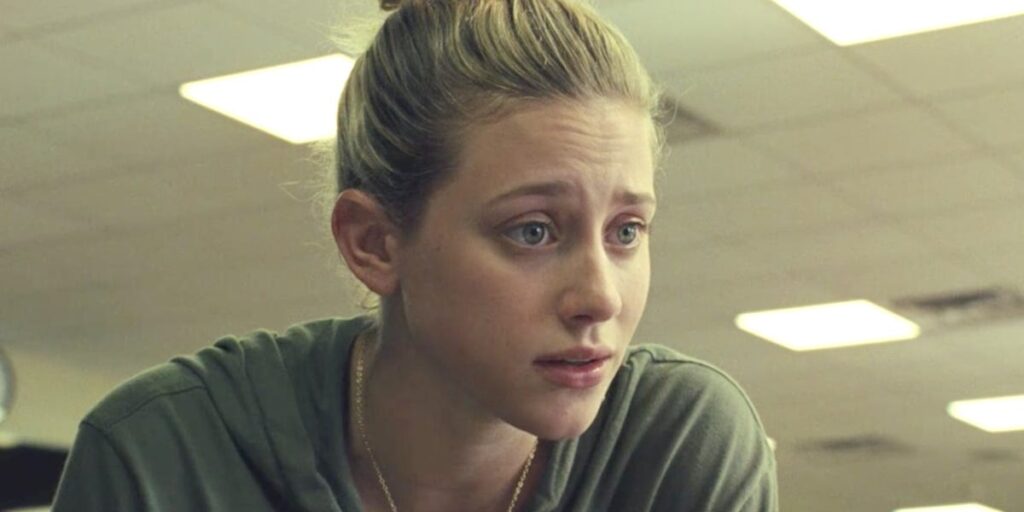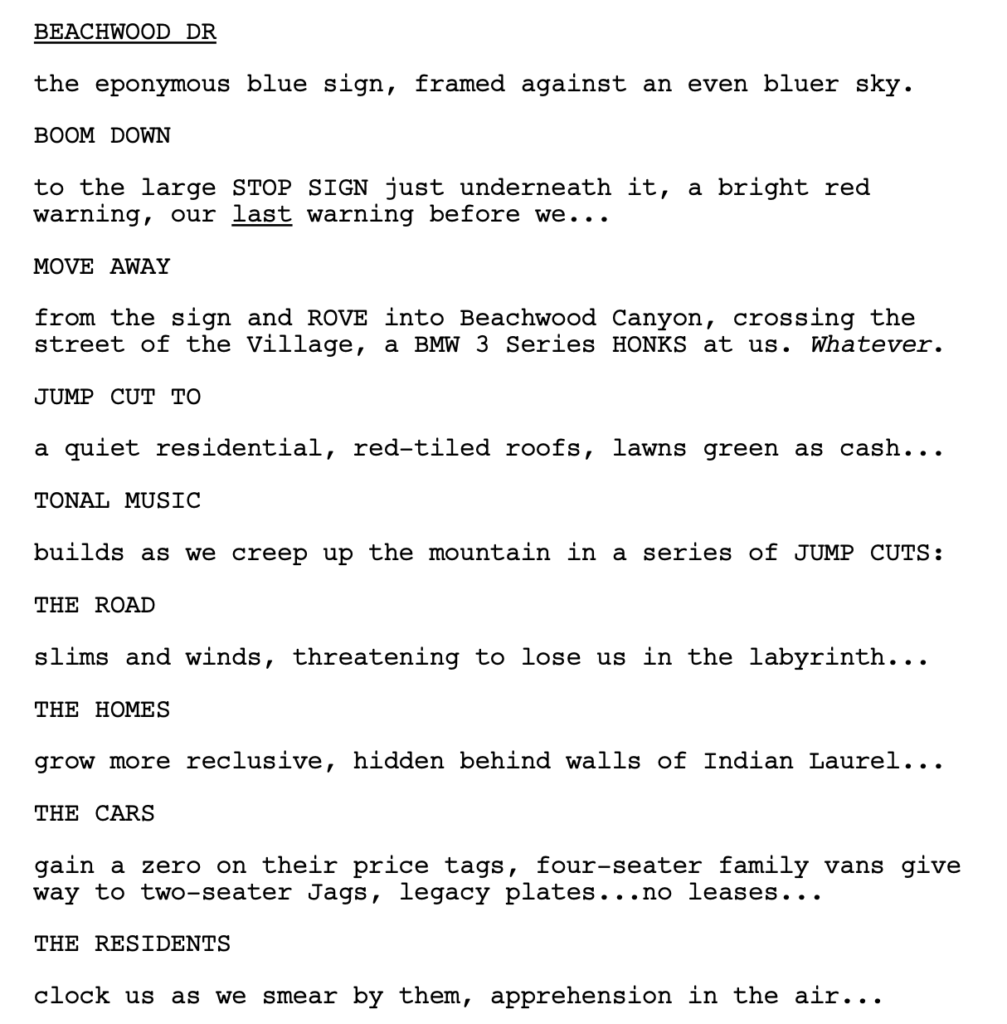Genre: Satire/Comedy
Premise: Shunned by elite society as a member of the gig economy, a sociopathic dog walker infiltrates an exclusive L.A. community with designs of reaching the top of the neighborhood’s social ladder.
About: This script finished in the top 10 of last year’s Black List with 20 votes. This appears to be the brothers’ first big screenplay.
Writers: Briggs and Wes Watkins
Details: 100 pages
 Lili Reinhart for Dylan?
Lili Reinhart for Dylan?
A few people told me this wasn’t very good. But it does come from a sub-genre that I like. So we’ll see what happens. Oh yeah, a quick note. This script has a lot of twists and turns. It is best enjoyed reading it yourself rather than reading my synopsis. Because my synopsis WILL reveal spoilers.
24 year old Dylan is squatting in a Hollywood apartment, not doing anything with her life that I could discern other than her hobby of sneaking into rich peoples’ houses and pretending that she lives there until the owners come home and she has to sneak out.
One night, while hanging out in a Beachwood house, a dog-walker comes in and catches her there. The dog-walker doesn’t report her though. Instead, she tells Dylan that if she wants to sneak into peoples’ houses, she should walk dogs.
This is a lightbulb moment for Dylan, who immediately visits a dog park the next day and notices a beautiful woman named Jessica walking an even more beautiful dog. Jessica’s dog is the clear star of this dog park and so Dylan tries to befriend her to see if she can work for her.
When Jessica blows her off, Dylan follows her up to a Griffith Park hill trail, kills her, then kicks her dead body over the cliff. She takes the dog, heads back to the owners home, and informs the couple living there, Shira and Jacob, that Jessica has moved on and she will now be walking the dog.
Dylan does this for a while until the dog attacks and nearly kills another dog who happens to be walked by… the very girl who caught her in the first house and told her about this whole dog-walking gig. Dylan makes a run for it but eventually, our initial dog-walker, whose name is Anna, finds her.
She makes casual chit-chat with Dylan BEFORE KILLING HER!!! That’s right. Another murder. Who wrote this? Bing ChatGPT? And we’re only on page 45! With Dylan now dead, we start following Anna, who wants to do what Dylan was doing who wanted to do what Jessica was doing.
Anna makes friends with some other dog-walkers but when they suspect that she may have some information on the death of Jessica, she goes into self-preservation mode. She then makes a bold move, blackmailing Shira and Jacob, knowing that if they don’t consider her dangerous, she’s done. Will Anna’s plan work? Or will she end up like her predecessors?
In the words of the great Iggy Pop, “I’m a real wild one. And I like a wild fun. In a world gone crazy. Everything seems hazy. I’m a wild one. Oh yeah, I’m a wild one.”
This was a wild one, folks.
I’m still not even sure what I read. But I wouldn’t call it un-entertaining. Maybe uneven.
Whenever you’re trying to write sophisticated satire – which I’m pretty sure is what this script is – you have to be smarter than everyone in the room. There can’t be any clunky moments or frayed edges. We really have to feel, as the reader, that you are in total command of this commentary.
I didn’t feel that way. It started with the opening page.

The “whatever” is unnecessary. “Green as cash” is not a great visual simile. The road “slims and winds.” “Slims” is an awkward word to use there. Hidden behind walls of “Indian Laurel.” I don’t know what that means. Is there a famous Indian girl named Laurel who’s cloned herself and stands outside every house in Beachwood? “Gain a zero on their price tags” is an, arguably, try-hard line. “As we smear by them” is a strange description. I have to strain to imagine it.
I’m probably being too hard on this page but it definitely prioritizes style over clarity and that’s something I never endorse. Clarity must always come first in screenwriting. So, right from the start, I was wary.
Another problem is that I could never figure Dylan out. Since her whole life was a lie, I didn’t have anything to grab onto, relate to, or care about. There was so much distance between me and her that I never felt close enough to her story.
Why is she doing this? Where did this compulsion come from? Why is she squatting around in Hollywood and sneaking into peoples’ houses? We don’t know. We’re asked to buy that at face value and that’s not how storytelling works. We have to know why humans are doing the things they’re doing in order to become invested and interested.
A good example is the movie, Emily The Criminal. In that screenplay, the writer makes sure to take us through Emily’s struggles of trying to get a job, subsequently working a job she hates. So that when she’s given this opportunity to make money by stealing, we know why she’s doing it.
Meanwhile, I barely know Dylan and, out of nowhere, she kills this dog-walker and kicks her off a cliff and I’m just supposed to go with it?
Of course, I eventually realized why this was the case. Dylan wasn’t written to make it through the story. She gets killed. Which was a huge shock. But it would’ve resonated more had we felt some attachment to her.
To the Watkins credit, there’s some fun stuff going on here with the way the characters feed into the story. We meet this random dog-walker in that opening scene – the one who catches Dylan in the home, then we forget about her. Only to meet her again, 50 pages later, and then she becomes the main character.
Dylan also meets this character named Noah in the dog park early on the story. He disappears. But then, when Anna takes the lead role in the story, she meets Noah as well and also befriends him. So it was cool how these characters were woven into this weird tapestry of a screenplay.
But I just don’t know what to make of this thing. There are so many creative choices that make you go, “hmmmmm….” There’s an entire scene dedicated to expressing a dog’s anal glands in front of a small audience that felt more like it belonged in a 1998 Farrelly Brothers movie than in this sophisticated satire.
And then there are only really short dialogue scenes the whole movie before 80 pages in where we get this gigantic six page dialogue scene that comes out nowhere. Some of you might not think that’s a big deal. But screenplays have a rhythm. And if you establish that rhythm only to completely upend it, it’s jarring. The reader isn’t sure what to make of it.
However, I will say this. This script is the most unpredictable script in the Top 10 of last year’s Black List. It’s weird. It’s kinda fun. Even though it has problems, it does leave an impression on you. For those reasons, I think it’s worth reading.
[ ] What the hell did I just read?
[ ] wasn’t for me
[x] worth the read
[ ] impressive
[ ] genius
What I learned: I like when writers keep their character in a state of desperation. It forces the character to constantly act and solve problems, which often results in interesting dramatic situations. Just as Dylan gets the dog-walking job with Jacob and Shira, she gets kicked out of the apartment she’s squatting at. So now she doesn’t have any place to live. This places a question in the reader’s mind – What is she going to do now? – that compels them to keep reading to find out the answer. If she never would’ve gotten kicked out, that’s one less reason to care what happens next.

